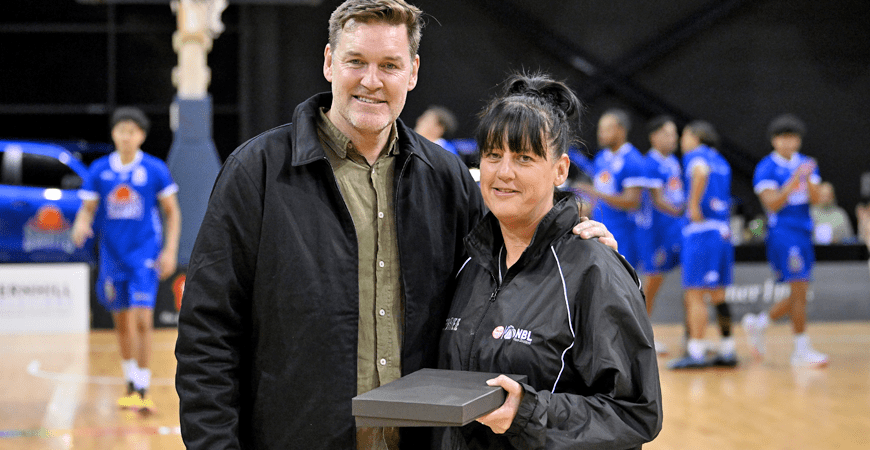Basketball New Zealand (BBNZ) and the Sal’s NBL are delighted to recognise a recent milestone by referee Melony O’Connor, who last week officiated her 400th game in the Sal’s NBL.
It has taken Melony twenty years of hard work to achieve this feat, which places her third all-time in games refereed – behind stalwarts Dallas Pickering and Stan Battock – and has seen her earn NBL Referee of the Year Awards in 2012 and 2021 and officiate in eight NBL Finals series.
It’s also part of a wider 35-year refereeing career for Melony, which has seen her officiate thousands of games at all levels. Outside of her on-court refereeing, Melony is also actively involved in the development of current and future referees, having worked in the referee space with BBNZ over the last ten years.
Melony says that she while appreciates the milestone, she is also aware of both the sacrifice and support involved in her achieving it.
“I’m delighted that I’ve reached this milestone, but it has come with a lot of hard work and a lot of support along the way, which of course I’m thrilled to have; it’s taken not only 20 years of my life, but my children’s and my family’s life,” says Melony.
“I’ve been fortunate that the father of my children has been extremely supportive throughout my 20 years in the league, and his co-parenting enabled me to travel around the country as a referee.
“For my children, who are now independent adults, a large part of their childhood was spent in stadiums – however with that came the bonus of them getting to meet a lot of fantastic players. I’m grateful for the opportunities that those who have put teams on the court and kept the NBL running, have not only given to me, but to my family.
“Throughout my career, I have grasped every opportunity provided to me to referee and as a mother which has often meant a lot of juggling. I can remember many times when I’ve been at netball or rugby with my children for the morning, then gone on to referee a game a few hours later.”
Melony says that her achieving this feat as a woman – in what she describes as a ‘a male-dominated environment’ – is not lost on her at all.
“For me it’s been a positive experience overall, and I’m thankful for the great support and friendships I’ve made over the years. However, there’s also been one or two along the way who were not always so supportive of me as a female official, and at times it took a lot of determination and perseverance to continue refereeing.
“Basketball has been rewarding to me, and I’m thankful for the personal growth and development that it has, through refereeing, provided me. Ultimately I continue to referee as I love the game – if I wasn’t refereeing then I’d likely be involved in some other capacity within the sport; so I’m thankful to BBNZ, the teams and their players, and to my fellow referees for their part in me getting to where I am today.”
BBNZ Chief Executive, Dillon Boucher – who presented Melony with a plaque in recognition of her 400th game at an NBL game on Monday – says she is a credit to the referee ranks and an inspiration to younger women in the sporting sector.
“Melony has worked hard over the past 20 years to get to where she is, and she is respected by not only her peers but by the players, the coaches and the fans,” says Boucher.
“400 NBL games is a huge achievement and it’s a testament to Mel’s ability as a referee that she’s achieved this. She’s a role model not just to the younger officials coming up through the ranks, but to females looking to get involved in basketball as a player, referee, coach or support crew.”
Melony says that for aspiring female referees, she advises them to be confident and to grasp whatever opportunities are provided to them.
“Today I see a lot of opportunities directly for female referees, which I never had. While I think it’s fantastic to see this, I believe that as females we should use these as an opportunity to empower ourselves to work hard and prove we’re just as capable as our male counterparts.
“Confidence is important, but I believe that one of the biggest attributes you can have as a referee is kindness. There are perceptions of what referees are, that they’re control freaks or crave power, but whether you’re playing or refereeing then the main thing is to be a good person on and off the court – and that needs to be reflected in the way you referee.
“I tell the young female officials to just to take the opportunities provided to them and to prove you belong there, that you’re there because you’re a referee and not just because you’re a female.”





























